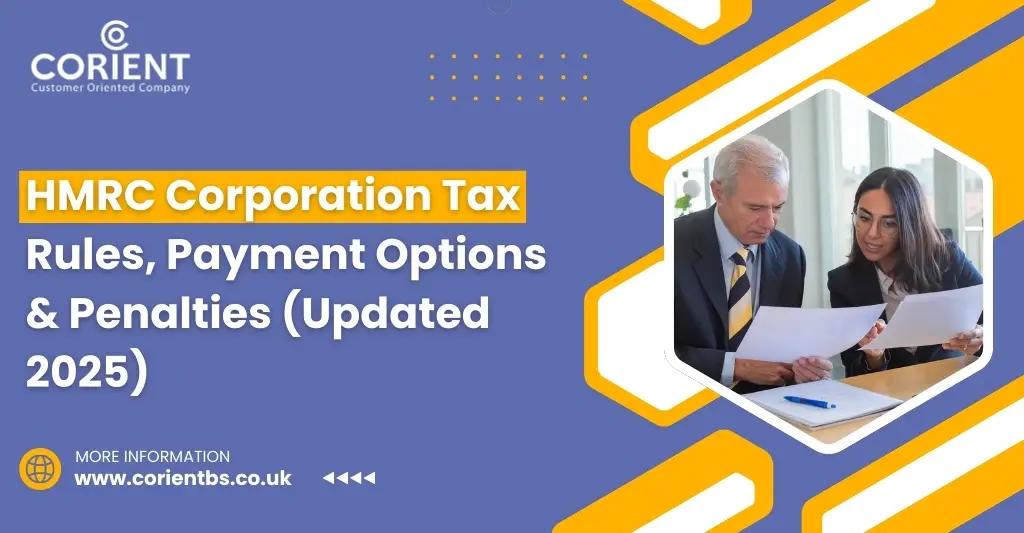
HMRC Corporation Tax Rules, Payment Options & Penalties (Updated 2025)
- HMRC Corporation Tax Rules for 2025
- Key Filing Deadlines for Corporation Tax
- Payment Options – How to Pay HMRC Corporation Tax
- HMRC Late Payment Penalties & Interest (2025 Update)
- How to Contact HMRC About Corporation Tax
- Common Mistakes That Lead to HMRC Penalties
- Best Practices to Stay Compliant in 2025
- FAQs – HMRC Corporation Tax (2025 Update)
- Final Thoughts – Stay Ahead of Corporation Tax Rules in 2025
Is your accounting team struggling to handle the corporation tax filing deadlines and payments for your clients? You are not alone. Every year, there have been frequent changes in HMRC corporation tax rules, such as filing rules, payment deadlines, and penalties and staying compliant with them is important. The year 2025 is no different, and corporation tax rules have seen further changes, making it even more important for you to understand these rules and responsibilities.
Handling it will not be easy but we are here to help you out. In this blog, we cover everything you need to know about corporation tax, from filing deadlines and payment options to penalties and best practices, so that you can stay ahead of your competitors.
HMRC Corporation Tax Rules for 2025
In the UK and all around the world, Corporation Tax is applicable on the taxable profits made by limited companies, foreign companies with UK branches, and certain unincorporated associations. The corporation tax rates and rules differ in different countries, and as for the UK, the HMRC Corporation Tax rules in 2025 emphasise:
- The main rate of 25% on profits over £250,000.
- A small profit rate of 19% for profits up to £50,000.
- A marginal relief system for profits between £50,000 and £250,000.
- Digital-first reporting in line with future Making Tax Digital (MTD) requirements.
Once the calculations are done, your practice on behalf of their clients must file the CT600 return and pay corporation tax.
Key Filing Deadlines for Corporation Tax
Unlike income tax, it is the responsibility of your clients to submit corporation tax return, calculate their tax owed over 12 months and make payments by pre-defined deadlines. Missing out on deadlines means heavy penalties; therefore, knowing the HMRC corporation tax deadlines is important.
As of 2025, the corporation tax deadlines are as follows:
1. Corporation tax must be paid to the HMRC within 9 months and 1 day of the end of the accounting period.
2. CT600, which contains detailed information of your client’s income, expenses, reliefs, allowances, and the final calculation of Corporation Tax due, must be filed within 12 months of the end of the company’s accounting period.
3. If your client earns profits of more than £1.5 million annually but less than £20 million, Corporation Tax must be paid in quarterly instalments over 12 months. The instalment schedule will be as follows:
- 6 months and 13 days after the first day of the accounting period for the first instalment.
- The second instalment will be 3 months after the first instalment.
- The third instalment will be 3 months after the second instalment (14 days after the last day of the accounting period)
- The fourth instalment will be 3 months and 14 days after the last day of the accounting period.
Payment Options – How to Pay HMRC Corporation Tax
There are many ways of making corporation tax payments. Some of those methods are:
- Online bank transfer (Faster Payments, CHAPS, Bacs)
- Corporate debit or credit card payment
- Direct Debit (set up through your HMRC account)
- At your bank or building society (using a payslip from HMRC)
HMRC ideally recommends digital payments for faster processing and better tracking.
HMRC Late Payment Penalties & Interest (2025 Update)

Missing the payment of corporation tax deadlines will lead to penalties. These penalties are as follows:
Daily Interest on Late Payments
Interest is charged automatically from the day after the payment deadline until the full tax is paid. The current HMRC late payment interest rate is 8% from 27 August 2025. The rate is linked to the Bank of England base rate, allowing it to change throughout the year.
Penalties
Even if you have paid corporation tax on time, HMRC can still impose penalties if the CT600 return is filed late. The penalties for late filing are:
- £100 up to 3 months
- Another £100 for over 3 months
- Above 6 months, HMRC will add a penalty of 10% the unpaid tax
- Above 12 months, another 10% of any unpaid tax
If the tax return is late three consecutive times, the £100 penalties are increased to £500 each.
How to Contact HMRC About Corporation Tax
If you need help, you can contact HMRC Corporation Tax services through:
- HMRC online services – log in to your company tax account.
Always have your Unique Taxpayer Reference (UTR) ready when contacting HMRC. However, we understand that contacting and resolving issues with HMRC will consume time and requires expertise to handle tricker questions. In such a situation, using corporation tax outsourcing services will be beneficial both to save time and resources.
Common Mistakes That Lead to HMRC Penalties
Many businesses have been penalised because of some mistakes which could have been easily avoided. It is your duty to ensure that your clients do not have to suffer that. Here are some of the common mistakes to be aware of:
Missing Filing Deadlines
One of the significant reasons for penalties is the failure to file the CT600 return. Even if your client has to pay a small amount of corporation tax, it is still important to file the CT600. Repeated failure to file will lead to an increase in fines and extra scrutiny by HMRC.
Incorrect Claiming Expenses
Mistakes are committed either by your clients when they claim non-allowable expenses, such as personal costs or entertainment that does not qualify. Or when you fail to claim legitimate expenses and reliefs, leading to your clients overpaying tax. Such errors will lead to increased scrutiny from HMRC.
Miscalculating Marginal Relief
Errors have become familiar with the introduction of marginal relief in 2023. Under it, businesses making profits between £50,000 and £250,000 can claim marginal relief. Practices sometimes miscalculate the effective tax rates, leading to overpayment or underpayment, which can result in disruption of cash flow or penalties.
Best Practices to Stay Compliant in 2025

The mistakes we mentioned above can be prevented, and the best way to avoid them is by staying compliant with the HMRC corporation tax rules. Here’s what you need to do:
Use HMRC-Approved Digital Accounting Software
With Making Tax Digital (MTD) becoming a compulsion in near future, it will be a great move to urge your clients to keep their records in digital format beforehand and submit them when required using compatible software. HMRC-approved platforms such as Xero, QuickBooks, Sage, or TaxCalc reduce the risk of filing errors. These tools will help you in collaborating with your clients and ensure data security.
Monitor Filing Deadlines Well in Advance
Set up reminders for your clients regarding corporation tax payments and CT600 filing. Such reminders will give your client enough time to make payments and submit early, giving you time to review and adjust. Missing deadlines is one of the common reasons for HMRC penalties, and only through proactive monitoring can you reduce the risk of penalties.
Educate Clients on Allowable Expenses
Many of your clients make the mistake of overclaiming or underclaiming, leading to either penalties or high taxes. Hence, it is your duty to guide your clients on allowable business expenses which are exempt from corporation tax, such as staff costs, office rent, and professional fees. Keeping receipts and digital records ensures claims can be supported if HMRC requests evidence.
Plan for Cash Flow to Cover Corporation Tax Payments
Late payments always attract interest. Therefore, you must encourage your clients to set aside funds on a monthly or quarterly basis towards their corporation tax bill. If your client is paying in instalments, then build a clear payment schedule to avoid last-minute stress.
Review Tax Calculations Carefully to Avoid Mistakes
Double-check calculations for corporation tax, especially where marginal relief applies. Use software to reduce manual errors, but always run a human review for accuracy. Common errors such as misreporting profits, forgetting reliefs, or inputting wrong figures can lead to HMRC challenges and penalties.
FAQs – HMRC Corporation Tax (2025 Update)
The main rate is 25%, with a small profits rate of 19% for profits up to £50,000. Profits between £50,001 and £250,000 are taxed using marginal relief.
Yes, HMRC allows Time to Pay arrangements for companies struggling with cash flow. You can apply online or call HMRC to set up instalments.
The most secure way is via online bank transfer or Direct Debit set up through HMRC online services. This ensures faster processing and confirmation of payment.
If Corporation Tax is paid late or not paid at all, HMRC will charge your client’s interest. The interest is charged from the day after the tax should have been paid (i.e., normally 9 months and one day after the end of your accounting period).
If your clients need more time to gather the funds to pay corporation tax in full, you can enquire about paying in instalments. HMRC may offer to set up a payment plan, a Time to Pay (TTP) Arrangement.
Here’s how you can contact HMRC for corporation tax inquiries.
By Phone
a. For general Corporation Tax enquiries, call 0300 200 3410 (within the UK).
b. If you are outside the UK, use +44 151 268 0571.
c. Keep your 10-digit Unique Taxpayer Reference (UTR) handy, you’ll need it when calling.
Online
d. Use HMRC’s online/business-tax account for many corporate-tax services or enquiries.
Final Thoughts – Stay Ahead of Corporation Tax Rules in 2025
For your clients, filing and payment of corporation tax is a crucial aspect of keeping their business running smoothly and compliant. However, the task is not easy, especially when rules keep changing, there is strict deadline enforcement, and there is the future application of MTD rules. By staying aware, planning and alerting payments for your clients, and using digital tools, you can ensure smooth corporation tax compliance for your clients.
In this endeavour, accounting outsourcing service providers like Corient can also make your life easier by doing the heavy lifting for you. Established in 2011, Corient has gathered talent and tools to make corporation tax compliance, payment, and filing an easy task for countless accounting practices in the UK. Our corporation tax services have achieved the critical goal of saving time, ensuring compliance, and promoting ease of doing business for your clients.
Ready to make Corporation Tax stress-free for your practice and your clients? Let Corient handle the deadlines, filings, and compliance. Connect with us so that you can focus on strategy and growth.


